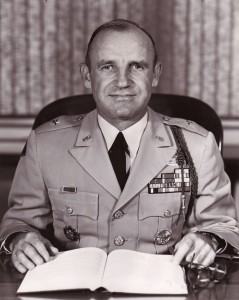George L. Mabry Jr. ‘40
June 2010
To observe Memorial Day, we thought it would be appropriate to recognize General George L. Mabry, Jr., the only Presbyterian College graduate to be awarded the Congressional Medal of Honor.
General Mabry was born in the small town of Stateburg, South Carolina, on September 14, 1917. While at Presbyterian College, he majored in English and minored in psychology. He also played baseball for four years and football for two. At the time, all P.C. students, including Gen. Mabry, participated in the college’s R.O.T.C. program. His dreams of teaching and coaching were interrupted by World War II, which the U.S. entered just 18 months after he graduated.He spent seventeen months in combat in France, Belgium, and Germany, and was with the 4th Infantry Division when it landed on Utah Beach on D-Day. He earned the Medal of Honor for his actions as the commander of the 2nd Battalion, 8th Infantry, in the Hurtgen Forest in Germany on November 20, 1944. His citation reads as follows:

“During the early phases of the assault, the leading elements of his battalion were halted by a minefield and immobilized by heavy hostile fire. Advancing alone into the mined area, Major Mabry established a safe route of passage. He then moved ahead of the foremost scouts, personally leading the attack until confronted by a booby-trapped double concertina obstacle. With the assistance of the scouts, he disconnected the explosives and cut a path through the wire. Upon moving through the opening he observed three enemy in fox holes whom he captured at bayonet point. Driving steadily forward, he paced the assault against three log bunkers which house mutually supported automatic weapons. Racing up a slope ahead of his men, he found the initial bunker deserted, then pushed on to the second where he was suddenly confronted by nine onrushing enemy. Using the butt of his rifle, he felled one adversary and bayoneted a second, before his scouts came to his aid and assisted him in overcoming the others in hand to hand combat. Accompanied by the rifleman, he charged the third bunker under point-blank small arms fire and led the way into the fortification from which he prodded six enemy at bayonet point. Following the consolidation of this area, he led his battalion across 300 yards of fire swept terrain to seize elevated ground upon which he established a defensive position which menaced the enemy on both flanks, and provided his regiment a firm foothold on the approach to the Cologne Plain. Major Mabry’s superlative courage during and leadership in an operation of major importance exemplify the finest characteristics of the military service.”
In addition to the Medal of Honor, General Mabry was given every decoration for valor that the US government can give during combat. Following the war, he went on to make a career in the army. He served as a regimental commander of the 31st Infantry Regiment in Korea from 1954-1956. He also spent ten years in the Panama Canal Zone. While he was there, he was very instrumental in establishing the U.S. Army Jungle Warfare Training Center at Fort Sherman in the Panama Canal Zone. He retired as a Brigadier General. He died in 1990 at the age of 72. While he didn’t grow up to be a teacher or a coach, Gen. Mabry said that his studies in psychology at PC were very helpful to him in dealing with soldiers who were under a great amount of stress. He also treasured his experience at PC because of the close associations he formed with his professors, coaches, and fellow students.
